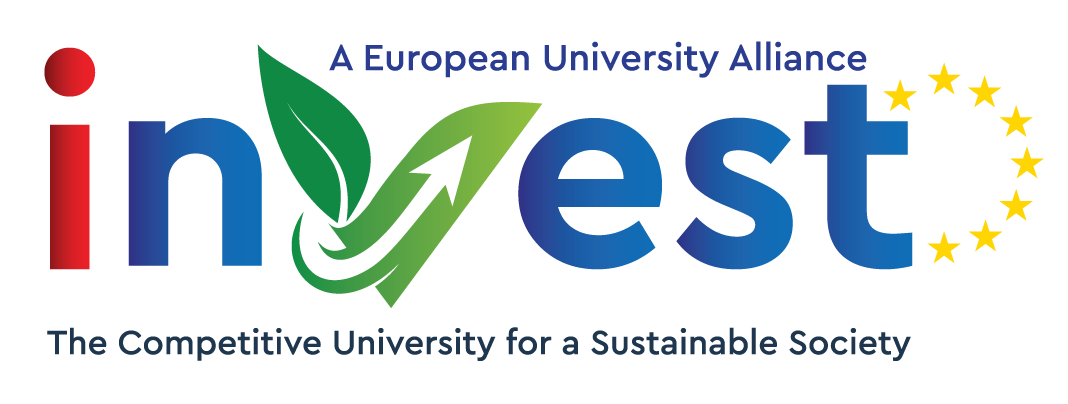HIGHLIGHTS FROM THE INVEST DIGITALIZATION CONFERENCE IN ATHENS!
The INVEST Digitalization Conference kicked off in Athens with a dynamic agenda focused on advancing digital tools and strategies in higher education. Here’s a look back at some of the highlights from each day:
Day 1: Introduction and Overview
The first day set the tone with an inspiring series of speeches:
-
Prof. Nicholas Samaras opened the day, welcoming participants and introducing the conference's mission to drive digital transformation across European universities.
-
Artemis Hatzigeorgiou, a distinguished researcher with a robust academic background, delivered a keynote address that highlighted how her team’s innovations are advancing understanding in fields ranging from agriculture to disease treatment, particularly in cancer and heart disease. Her research reflects the transformative power of digital tools, showcasing applications that push the boundaries of biological data analysis.
-
Omiros Iatrellis presented "Enhancing Student Success with the EDUC8EU Smart Advisor," showcasing how EDUC8EU harnesses AI to provide personalized guidance and academic support. This platform helps students navigate their educational pathways, improve study planning, and engage with learning resources tailored to their needs.
-
Lefteris Papadopoulos introduced "INVEST 1.0 Digital Tools," offering a high-level overview of the Virtual Campus platform. He highlighted its core infrastructure, new tools for collaborative learning, and introduced the alpha version of the Micro-Credentials Platform, which promises to provide accredited skill-building opportunities.
-
Areti Bania delivered an insightful presentation titled "Applying RES-Q Living Lab Research to Real-World Disaster Scenarios." Her talk showcased how living lab frameworks can be applied to improve preparedness and resilience in disaster-prone areas, with implications for educational institutions looking to integrate community-based, hands-on research approaches.
-
Maria Drogkoula delved into "The Cross-Disciplinary Promise of AI: From Environmental Science to Education," discussing the transformative impact of AI across fields. She highlighted how AI-based tools can bridge disciplinary gaps, offering new insights and solutions for both environmental challenges and educational advancements.
-
Konstantinos Kokkinos shared "The Next Chapter: Unveiling Phase 2 Digital Innovations in the INVEST Project," providing an exciting preview of the upcoming advancements that will build upon the foundational successes of INVEST Phase 1.
-
A student presentation followed, with Evangelos Balamotis sharing personal experiences from participating in INVEST activities, highlighting the real-world benefits and impacts of the program on their academic journey.
-
Andrean Lazarov wrapped up the speeches with "The Role of Leadership in Educational Innovations," exploring how effective leadership and vision can drive innovation within educational institutions, fostering environments conducive to learning and discovery.
The day concluded with an Interactive Q&A Session, where attendees engaged directly with speakers, asking insightful questions about the presentations. Later, participants joined the hands-on session on the EDUC8EU System, led by Omiros Iatrellis, where they explored the platform's features and learned how to integrate academic programs with the system.
Day 2: In-Depth Training on the Virtual Campus
Day 2 offered a deep dive into the Virtual Campus, a central platform for digital learning within the INVEST alliance.
- Lefteris Papadopoulos started the day by guiding attendees through the platform’s tools, demonstrating the site’s structure, and explaining how features like the EOSC-integrated Open Science Repository and tools like MessengerHub, Notepad, and Task Scheduler enhance collaboration and process management for students and faculty.
Day 3: Micro-Credentials Focus
The final day was dedicated to the exciting potential of micro-credentials in higher education.
-
Lefteris Papadopoulos presented the new Micro-Credentials Platform, which provides students with flexible, stackable credentials for skill development. This platform is poised to be a valuable tool for lifelong learners and institutions aiming to expand their credential offerings.
-
Omiros Iatrellis introduced the Capability Maturity Model for Micro-Credentials, a structured framework to help institutions assess and advance their readiness to deliver high-quality micro-credential programs, ensuring alignment with the evolving needs of the workforce and students.
The conference concluded with an Open Discussion and Wrap-Up, where participants shared insights on the integration challenges and future potential of micro-credentials within the European educational landscape. The INVEST Digitalization Conference in Athens successfully provided a collaborative space for INVEST partners to explore digital tools and strategies, driving innovation and integration across European higher education institutions. Looking forward to continuing this journey together!
